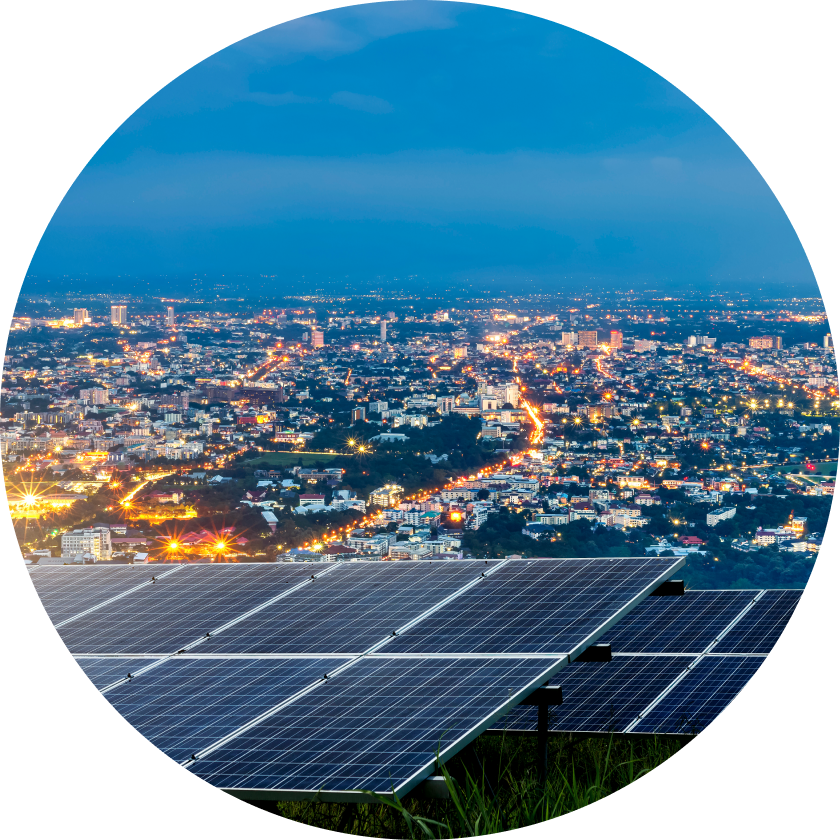Scaling up MIGA'S work

In FY23, 46 percent of the climate finance delivered through MIGAguaranteed projects supported “greening” financial institutions across the LAC, ECA, SSA, and the MNA regions. Engagement with financial clients for climate activities was executed through two MIGA guarantee products: capital optimization for private sector financial institutions and non-honoring of sovereign financial obligations, available to eligible public sector institutions.
Overall, MIGA guaranteed 20 transactions supporting the financial sector in developing countries, totaling $3.1 billion, including $705 million for climate finance. MIGA also offered technical support to financial institutions to accelerate climate commitments and incorporate climate actions into business practices. Three MIGA-supported climate finance projects in the financial sector are highlighted below.

Working in partnership with financial institutions across the globe, MIGA can make a tangible difference in improving the lives of people and in preserving a livable planet. Hiroshi Matano Executive Vice President, MIGA

Botswana
MIGA’s partnership with the Botswana Development Corporation (BDC), the leading development finance institution in Botswana, is expected to enhance the climate resilience of the country's private sector. BDC will use 100 percent of a $52 million long-term loan from Commerzbank Aktiengesellschaft, guaranteed by MIGA’s non-honoring of a financial obligation by a state-owned enterprise (NHFO-SOE) instrument, for climate mitigation and climate adaptation projects in the Botswana private sector. These loans from BDC to the private sector will diversify the economy, reducing its reliance on diamonds, and enhance climate resilience—an example of how MIGA collaborates with partners in the public and private sectors to magnify “win-win” outcomes by connecting development and climate action.
Read more
Argentina
Argentina is highly vulnerable to climate change, mainly due to risks from droughts and floods. Over the last year, Argentina has been experiencing a severe drought which has crippled agricultural output resulting in a projected contraction of GDP of 2.5 percent in 2023, according to the International Monetary Fund (IMF). In FY23, MIGA, working closely with its long-standing client—Banco Santander S.A. and its subsidiary in Argentina— increased an existing capital optimization guarantee, a special application of MIGA’s political risk insurance (PRI) instrument, that enables the expansion of lending by Banco Santander Argentina. The increase of $100 million in the guarantee amount will be directed on a best-efforts basis to support lending for climate finance in the country with an emphasis on renewable energy and sustainable agriculture projects. These activities are aligned with the country’s new 2022 Climate Change Adaptation and Mitigation Plan which focuses on expanding renewable energy, agro-ecology and sustainable transport; controlling deforestation and conserving natural ecosystems; and improving livestock practices.
Read more
Colombia
Also in Latin America, MIGA worked to help support the climate aspirations of Financiera de Desarrollo Territorial S.A (Findeter), a client it has worked with previously. Reflecting Findeter’s public sector role, MIGA deployed its credit enhancement guarantee (NHFO-SOE) to unlock JP Morgan’s commercial loan of almost $135 million to this Colombian development bank. Of the loan proceeds, a large portion will be used by Findeter to finance climate infrastructure projects with an emphasis on renewable energy, energy efficiency, sustainable public transport, and water and sanitation. These projects will help Colombia diversify its energy mix and reduce climate risks while fostering green and inclusive economic growth.
Read moreMIGA projects supporting economic growth and low carbon development
FY23 saw 54 percent of climate finance from MIGA-guaranteed projects supporting real sector projects across LAC, ECA, SSA, and the MNA regions. MIGA’s guarantees supported projects delivering climate finance in each of MIGA’s three real sector divisions: Energy and Extractive Industries (26 percent of climate finance); Infrastructure (18 percent of climate finance); and Manufacturing, Agriculture, and Services (10 percent of climate finance).
Across the 15 projects with climate finance MIGA supported in the real sector, one was provided through MIGA’s Non-Honoring of Financial Obligations products, with the remaining projects supported by MIGA’s political risk insurance product. By number of climate finance projects, MIGA’s real sector projects were concentrated in SSA, where MIGA delivered nine climate finance projects. In total, in the real sector, MIGA delivered $826 million in climate finance. Three MIGA-supported climate finance projects in the real sector are highlighted below.

Democratic Republic of Congo
Off-grid solar power is a promising technology to bridge the electricity access gap in rural areas without grid-connected power. MIGA is partnering with Bboxx, an innovative company operating in Africa, to expand access to this technology. In FY23, MIGA expanded this collaboration, supporting Bboxx’s operations in the Democratic Republic of Congo (DRC) through political risk insurance cover to the Facility for Energy Inclusion’s Off-Grid Energy Access Fund (FEI-OGEF LP). Bboxx aims to increase access to affordable and reliable clean energy, boost economic growth, reduce GHG emissions, and create jobs through decentralized solar-powered systems. Individual solar home systems include equipment such as lights, television, and refrigerators. Bboxx is also promoting clean cooking, an urgent development issue with significant benefits for public health, gender equality, the local environment and the global climate, through liquified petroleum gas and small gas burner products. (See The World Bank Group: Innovating Solutions to Bridge the Energy Access Gap).

Kenya, Namibia
In SSA, MIGA continued its partnership with Kasada Hospitality Fund, supporting its equity investments aimed at refurbishing, or acquiring new hotels, that meet green building standards. In FY23, MIGA signed three additional political risk insurance contracts with Kasada under a master contract signed in FY21, bringing the total number of individual guarantee contracts signed by the end of FY23 to 12, with a total gross issuance of $125.5 million. Kasada aims to establish a portfolio of over 20 hotels (estimated at 4,000 hotel keys), requiring a total investment of $1 billion, comprised of both equity and debt.
Read more
Mexico
Mexico’s updated 2022 Nationally Determined Contribution—the country’s climate action plan to cut emissions and adapt to climate impacts, under the Paris Agreement—emphasizes the modernization of existing hydro power plants. In FY23, MIGA collaborated with Comisión Federal de Electricidad (CFE), Mexico’s state-owned integrated utility, deploying a MIGA NHFO-SOE to successfully secure long-term financing of 15 years from two private sector commercial banks (JPMorgan Chase Bank, N.A. and Hongkong and Shanghai Banking Corporation Limited) for the project. The proceeds of the underlying project loan of $326 million covered the modernization of seven existing large hydropower plants. The modernization of the seven hydro-power plants will enable an increase in renewable energy generation by 113 MW, producing about 1,426 GWh of additional electricity per year and preventing more than 500,000 tons of CO2e emissions annually. Additionally, the operational lifespan of the HPPs will be extended by decades—potentially up to 40 years.
Read more

Sustainable Development Goal 7 aims to ensure access to affordable, reliable, sustainable, and modern energy for all by 2030. However, the World Bank estimates that, at the current rate of electrification, over half a billion people in SSA will still lack electricity access in 2030. To meet Sustainable Development Goal 7, the current rate of electrification would need to triple.
The World Bank has put forward that decentralized renewable energy (DRE) represents the swiftest and most cost-effective way to accelerate electricity access in rural areas, particularly in Fragility, Conflict, and Violence settings. DRE systems typically involve solar photovoltaic stations paired with battery storage. They can be easily installed, are dependable, and do not require the large investment needed to build a utility-scale power plant. Nonetheless, national grids, interconnected regionally through financially viable utilities, will continue to play a central role in achieving universal energy access, especially in urban, peri-urban, and relatively nearby rural areas.
Read more




